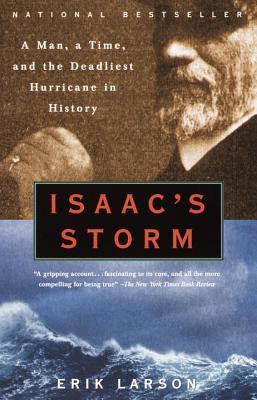First sentence: Throughout the night of Friday, September 7, 1900, Isaac Monroe Cline found himself waking to a persistent sense of something gone wrong.
Premise/plot: Isaac's Storm is a nonfiction book about the hurricane of 1900 that devastated Galveston, Texas. It partly chronicles the life and times of Isaac Cline, the head meteorologist in Galveston, and partly chronicles the storm and its impact on the other residents of Galveston, Texas.
My thoughts: A little while ago I reviewed Al Roker's Storm of the Century. Both books are about the same subject. I am so glad I read both books because it serves as a good reminder that there is always more than one perspective.
Having just read the other book, I had plenty of details still in mind. What I didn't learn in Roker's book was the incredibly bitter falling out between Isaac Cline and Joseph Cline.
These two brothers worked side by side. Isaac was the head meteorologist in Galveston, but, Joseph was employed under him as an observer. (I believe there may have been other employees as well.) These two--as presented by Larson--appear to represent two extremes. Isaac perceived Joseph as being the chicken little, 'the sky is falling' type. His conclusions based on observations and instrument readings tended to err on the side of something bad could happen. Joseph perceived Isaac as being too cautious, too calm and relaxed. The same observations and readings often led Isaac to conclude that everything would be okay, there was no reason to worry.
Isaac, no doubt about it, seemed to live in a make-believe world where nothing truly bad could ever happen to Galveston. Galveston need a sea wall? RIDICULOUS. Hurricanes never enter the Gulf of Mexico. That was just one of his many, many reasons he gave for why Galveston was one of the safest places to live, to build, to work.
So as the storm approached and hit, Joseph and Isaac had VERY different reactions. Here is where this book differs from Roker's a bit. After the storm, Isaac and Joseph both wrote and published accounts of the storm. (By this point the two were bitterly estranged.)
There are differences between
- what Isaac actually said and did during the storm
- what Isaac initially said and wrote directly after the storm
- what Isaac wrote a decade or so after the storm
- what Joseph wrote about the storm
- other people's accounts of the storm and how the brothers entered into it (if they did)
Directly after the storm, Isaac Cline supported the weather bureau and praised his boss. He was more concerned about protecting the bureau at a vulnerable time in its history than telling the truth, the whole truth, and nothing but the truth. Moore, his boss, sent warnings to Galveston, he said. Those messages must not have gotten through because of downed telegraph lines. But Moore knew the storm was coming and did his part to prepare the island. There's no real evidence to back up this possible flim-flam. Cline was still very much concerned about his career. He did receive a promotion after the storm. But later he was demoted and sent to one of the worst centers--regions--in the country. The one with the worst meteorologists, the worst reputation. By the time he was writing his memoirs, I believe he'd had a complete falling out with his former boss. So in his memoirs, he was the daring, rule-breaking meteorologist who saw the storm coming and acted to save lives. He claims that his warnings led to thousands leaving the island by train early in the day. (Is this true? Did the trains take that many people off the island? Was there a rush to leave while they still could? Or did Cline make this up years after the fact?) If Isaac Cline was making his best effort all that day to save lives, to cry warning to the residents, why did do many die? Did he know that it was impossible to save everyone, that there wasn't enough time and enough resources to evacuate everyone? Did he want to avoid creating a panic-driven riot? If he believed that the storm was as dangerous as he later claimed, why didn't he act to get his own family to safety? Just as he was confident that nothing bad could ever happen to Galveston, he seemed to be confident that his new house could withstand any storm no matter what. (It didn't.)
The facts of the storm are brutal; the images are haunting.
I would recommend both books. It's a complex story--perhaps one with no heroes.
© 2018 Becky Laney of Becky's Book Reviews


No comments:
Post a Comment